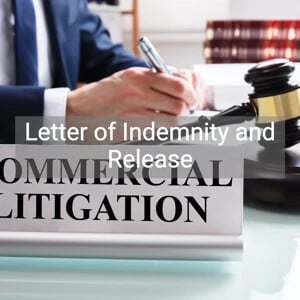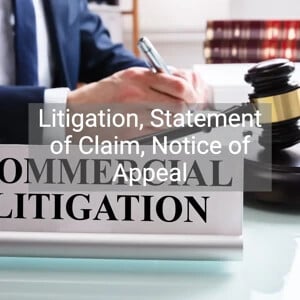Letter before Action / Denial of Claim


A letter before action (also known as the claim letter) is a letter sent to the recipient to ask him/her to make a payment, perform certain actions, or stop from continuing a specified action. This is usually the last resort before filing a lawsuit. Litigation is a very lengthy and expensive process. So before commencing legal action, it is usual to send a letter before action to give the other party the last chance to pay off the debt or resolve the issue. If the letter is well written, the other party will quickly understand the seriousness of the situation and can make a decision without going to court.
Therefore it is important for a letter before action to be well and correctly drafted. An inconsistent or factually inaccurate letter may greatly damage the ultimate prospect of success, whether in court or in the settlement process. One may seek to use a law firm to prepare the letter that can also provide advice on the prospect of the case. The other advantage is that the other side is likely to take a letter from a law firm more seriously. However, drafting a letter before the action is not difficult to learn if you do not want to spend money to hire a lawyer.
It is generally not necessary to send a letter before action prior to filing a claim in court against someone. However, it may be more cost-effective to issue a letter before action first to see if the matter can be resolved without going to court. This will save both parties from incurring legal expenses and court fees.
Most jurisdictions encourage alternate dispute resolutions out of court. If you have gone to court directly, then you may need to explain why you have not chosen to resolve the problem first with a letter before action. If the defendant is not aware of the claim and no warning has been issued by you first, then you are less likely to be awarded legal costs even if you win the court case.
In addition, specific rules apply to the requirements of letters before action for certain types of claims. You may need to check the status of the following types of claims in your jurisdiction (including but not limited to the below):
The Letter before Action should specify the following information:
1. Name and address of the other party.
This should be the same party as the potential defendant in the litigation, whom you may need to serve a writ to commence litigation in the future.
This could be the invoice number for unpaid goods or services, or the other party’s reference number if you are seeking damages or compensation in relation to the provision of goods and services. You should also clearly state in the subject heading that this is a “Letter before Action”.
You should start your letter by referring to the previous correspondence with the other party and the issues you would like to resolve (assuming previous attempts to resolve the issues amicably have failed). Also refer to any responses received from the other party, such as the "excuses" to explain why no payment was made for the amount owed or the lack of acknowledgement of responsibility. List the date you sent the letters with copies of the invoice and other documents. Include wording to the effect: "Despite repeated requests, you have not paid the amount / comply with our request.”
The claim should say that the full amount of debt is now due. Set a deadline (include both date and time) for payment, usually around a week. State that if you do not receive payment in full by the deadline, you can commence legal proceedings against the other side. You can also state that interest and costs will be charged for payments after the deadline. You should ask them to mail you a cheque or provide your account details for them to make payments.
The claim could be of a non-monetary nature such as the following:
Breach of Contract -This does not necessarily mean that the innocent party has the right to automatically terminate the contract. On the contrary, it may be necessary to list the breach of contract in the letter before action and require the breaching party to remedy it within a reasonable time frame.
Breach of Confidentiality Obligations or Privacy Law - The letter would require the other party to reveal all unauthorised disclosures and require them to return or destroy all copies.
Cease and Desist Letter – This is applicable where there are allegations of defamation, or breach of intellectual property rights (please refer to the section on Cease and Desist Letter).
Depending on the situation, you may want to give the other party a slightly longer period to comply than a monetary payment (e.g. 14 days).
You should include a final warning in your concluding paragraph - "In order to avoid being affected by the county court's judgment and/or execution procedures against you in the future, you must immediately pay the unpaid amount / comply with the terms of this letter."
At the bottom of this page, write in bold: "Please pay attention to this matter immediately. Please note that we will not issue any further notice. "
In your letter before action, do not make any concessions or include any settlement terms. If it does go to court, you would want to claim the full amount instead of a discounted amount. In addition, you should not make any extortion or threats in your letter (including threatening to report the matter to the police or a regulator if no payment is received), this can be seen as blackmail and may incur criminal liability.
If your letter has been ignored - i.e. no payment has been received, or your requests have not been complied with, you can proceed with filing a claim in court. As to which court to file in would depend on the jurisdiction of the court and the size of your claim. Judges in the Small Claims Tribunal favoured claimants who had exhausted all other options before resorting to litigation.
As mentioned previously, alternate dispute resolution methods are encouraged since they are generally less expensive and time-consuming. Civil litigation rules clearly stipulate that court proceedings should be the last resort. However, for clear money claims without dispute, it may be easier to go to court and get a summary judgement than through mediation or arbitration.






Not the right document?
Don’t worry, we have thousands of documents for you to choose from: